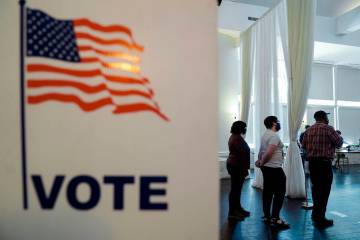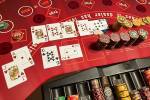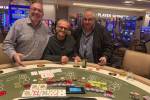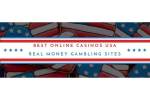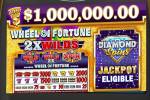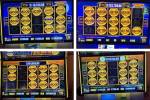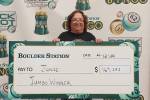Desperation plain to see with problem gamblers in Las Vegas
Super Bowl 50 will come and go. One side wins, the other loses, and then they sweep confetti. Despite the hype on Sunday, you still have to report for work Monday.
It's not that way for Andy. For him, every sporting event on the board constitutes the game of his life.
Take that recent UNLV-New Mexico game, for example. The inconsistent Runnin' Rebels lost. No surprise there.
Here's how Andy recalled it.
"After a meeting on Saturday, I took care of some work around the apartment, and I went over and I sat in front of a teller at a race and sports book knowing that UNLV was going to lose Saturday afternoon — just knowing like it was a gift from on high," he said, the intensity rising in his voice. "I sat there in front of him, and I didn't get up and buy a ticket, but I didn't like the way I felt. I went home and I turned the game on later, and of course it turned out as I had made the mental bet. And I thought to myself, you know, I might just as well go and get a Smith & Wesson and, you know, put one cartridge in it. If I'm going to sit in front of a sports book ticket writer imagining a winning proposition, how well am I?
"And the answer to that is, not very well at all. And that's why I'm here."
I met Andy, a local casino employee, Tuesday during Rob Hunter's weekly open house at the Problem Gambling Center. Hunter is the center's director and holds a doctorate in clinical psychology, but his real expertise has been earned by working for decades with thousands of compulsive gamblers.
Hunter knows Andy's high anxiety. Thoughts of suicide, frustration and guilt are all signs of a disease that still manages to receive too little attention in the world's best-known gambling city. The lack of a high-profile and major funding for compulsive gambling in Southern Nevada is one of the shames of this community.
Hunter also knows something Andy and his friends at the group session aren't always sure of: With treatment and understanding, there is hope for the gambling addict.
Some would ignorantly write off the disease as the result of a lack of willpower or a failing of character, but Hunter says the brain of the compulsive gambler is wired differently and physically resembles closely those of the drug addict and alcoholic.
As I listened to the stories of the 14 participants in the group session, with all honoring the rule of anonymity, a pattern emerged. Their games varied, with a large minority battling with video poker, but they all shared similar experiences. Not just devastating financial losses and the disappointment of lying to hide their compulsive behavior, but of the ache and anxiety of the addiction itself.
For compulsive sports bettors like Andy, the Super Bowl is sometimes considered a desperate last-chance game, where players hopelessly buried try to "double up to catch up." But they're just kidding themselves.
For the addict, it's not about breaking even or beating the sports book. It's about feeding a bottomless hunger that can only be sated by fasting.
It's a hard fact Charles has learned only after losing a good-paying casino job he held more than 22 years. He and his buddies bet every day on the job until the job was gone.
"Today I feel really balanced and very peaceful for someone that's lost their job after that long of a period of time," he said. "Ever since I lost my job, I don't have the urge to go back to that. The main thing I have is my wife and my kids, which are my high. They support me, and my true family supports me."
But like many in the room, he also knows that it will take a combination of clinical therapy and the 12-step blessing of Gamblers Anonymous to continue on the road to health.
For Tim, a military veteran and compulsive sports bettor, there are no highs yet. His voice was full of the addict's jitters.
"Urges?" he asked uneasily. "All the time. I'm doing better. I got rent paid. I got back rent paid. I got all my bills caught up. I mean, I'm broke, but everything's paid this time instead of not paid and not having any money. So I guess I can thank this program here, and I'm really enjoying GA."
He goes to meetings every night.
For Andy, whose job puts him in contact with high rollers capable of betting more than his annual salary on a ballgame or a turn of the cards, serenity appeared a distant dream.
"I think anger is more constructive than despair. And as long as I don't hurt someone else or myself, I'm pretty sure that it will pass," he said to the group. "But in the meantime, Lord have mercy, I'd just like a little relief. That's all."
If that sounds like a prayer, it's because it was one.
May it be answered, and soon.
— John L. Smith's column appears Sunday, Tuesday, Wednesday, Friday, and Saturday. Contact him at 702 383-0295, or jsmith@reviewjournal.com. On Twitter: @jlnevadasmith.






